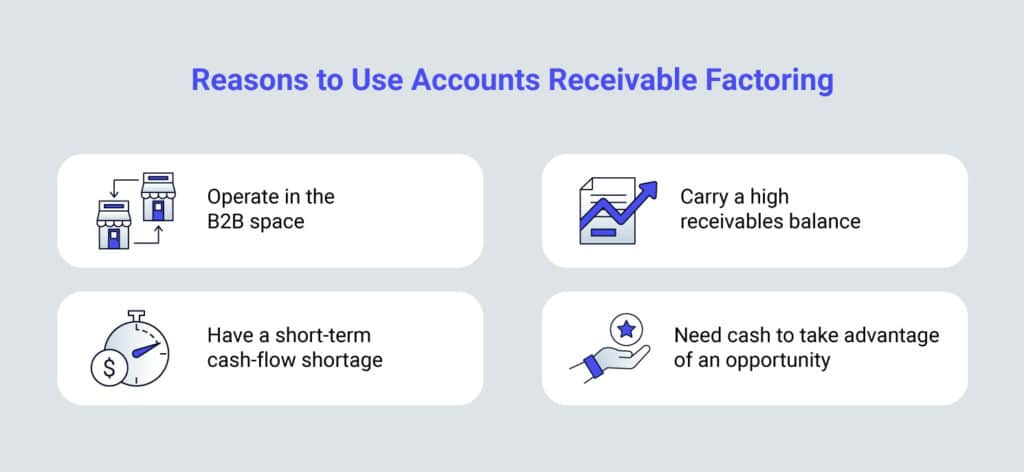Exchange Outstanding Client Bills for Cash
As much as we’d like them to, invoices aren’t always paid on time. And even when they are, repayment terms often leave you with gaps in your cash flow as you wait 30, 60 or 90 days to get paid.
When you’re counting on this capital to maintain day-to-day operations, pay staff and support growth, it can put your small business under financial strain.
But what if you could get paid now for the work you’ve already delivered?
With accounts receivable factoring, you can.
Contents
SECTION 1
What Is Accounts Receivable Factoring?
Accounts receivable factoring is a type of asset sale in which a factoring company, also referred to as a factor, purchases an interested business’s unpaid receivables and takes over collections of those receivables. In return, the factoring company advances the business a percentage of the face value of the invoices.
How Does Invoice Factoring for Small Businesses Work?
The factoring company provides an advance to the business seeking funding, often 70%-90% of the invoice value.
The amount the business receives and the cost of the advance depends on several factors, such as:
- Size of the invoice(s)
- Average days receivables are outstanding
- Creditworthiness of the customers with outstanding invoices
- Industries of the customers to whom the receivables are attached
Once the factoring company collects on the outstanding receivables, it pays the advanced business the remaining balance, minus its factoring fees, also known as the discount rate. These fees typically accumulate weekly until the receivables are paid.
SECTION 2
When Does Accounts Receivable Factoring Make Sense?
If you operate in the business-to-business (B2B) space and issue invoices with clear repayment terms, you’re eligible for invoice factoring. It’s an especially useful tool if you work in an industry with long payment cycles, as factoring accounts receivable allows you to tap into the cash that’s tied up in that process.
What’s more, as factoring decisions are based primarily on the quality of the invoices themselves, the review process is far faster than you’d experience when applying for a conventional small business loan. In fact, funds may be issued the same day you apply in some cases.
Businesses might consider using invoice factoring if they:
- Operate in the B2B space
- Carry a high receivables balance
- Have a short-term cash-flow shortage
- Need cash to take advantage of a business opportunity

SECTION 3
What Do the Best Small Business Invoice Factoring Providers Look For?
Typically, the following invoice characteristics will result in the most favorable accounts receivable financing rates and terms.
Newer Invoices
Newer invoices are seen as more valuable since the possibility of payment is more likely compared to older invoices. You can increase your chances of qualifying for accounts receivable financing if your invoices have been newly issued.
Larger Companies
Lenders find invoices more valuable if a larger business with significant annual revenue is responsible for payment. On the other hand, if your client lacks working capital, you may not qualify due to the risk that comes with your invoice.
Smaller Invoices
Small invoices are less of a gamble to accounts receivable factoring companies. The less money your client owes, the more likely they are to pay
SECTION 4
What Does Accounts Receiving Factoring Cost?
The cost of invoice financing will depend on your factor rate and the time it takes your customers to pay their receivables.
Accounts receivable factoring rates often range from 1%-5%. Smaller invoices and invoices of customers that are higher risk often have factoring fees on the higher end. You may also be responsible for a 1-time processing fee.
Accounts Receivable Factoring Example
Let’s say you want to factor $20,000 in invoices. The invoice factoring company charges a 1-time processing fee of 3% and a weekly factor rate of 2% of the total value until the invoice is paid in full. They advance you 85% of your invoices, or $17,000.
The cost structure would look like this:
-
Amount of financed invoice: $20,000
Advance amount: $17,000
One-time 3% processing fee: $600
1.02 weekly factor rate: $204 per week
It takes your customer a total of 3 weeks to repay the invoice. As a result, the invoice factoring company deducts $1,212 from the $3,000 reserve amount.
| Fee | Weeks to Repayment | Total | |
| One-time 3% processing fee | $600 | N/A | $600 |
| 1.02 weekly factor rate | $204 per week | 3 | $612 |
| Total Invoice Financing Cost: $1,212 | |||
The invoice financing company issues you a $1,788 rebate.
| Reserve | $3,000 |
| Total invoice financing cost | $1,212 |
| Rebate: $1,788 | |
SECTION 5
How to Qualify for Small Business Invoice Factoring
One of the benefits of accounts receivable factoring is that your customers’ financial qualifications (not your business’s) are what matter most to accounts receivable lenders.
The best accounts receivable factoring companies will perform a reputational analysis, business credit check and thorough examination of your customer’s payment history with your company.
While the health of your business is less relevant, it may still come under review and influence offered advance and factoring rates.
SECTION 6
Accounts Receivable Factoring: Frequently Asked Questions
Accounts receivable financing and factoring are different.
With accounts receivables financing, you use the value of your invoices to secure an advance or line of credit. The financing company gives the borrower a percentage of the invoice’s face value but does not take over collections. Instead, the borrowing business remains responsible for collections and pays back the debt with equal installments over the course of a financing term, usually 3-6 months.
In contrast, accounts receivable factoring companies actually purchase the invoices from the company seeking funding. The factor takes over collections and may contact the customer for payment.
When accounts receivables are factored with recourse that means the factoring company can demand payment from the business that sold its receivables if the invoiced customers do not pay their debt. This type of factoring often has lower rates than non-recourse factoring because there’s less of a risk for the factor if the invoices are not collectible.
Pros
- Improved cash flow: Late payments can put a strain on cash flow. By taking out an advance against receivables, you gain access to cash without having to ask your clients for immediate payment.
- Better borrower accessibility: To get approved for a conventional loan, banks often require collateral, a solid credit score and years in business. However, many small business owners don’t meet these requirements. Because accounts receivables factoring is based on the likelihood that an invoice will be paid, you don’t need to provide collateral. Your customers’ ability to repay their debts is what matters most to lenders.
Cons
- High costs: Invoice factoring has higher rates than many other small business financing products, with factor rates often charged weekly until the customer remits payment on outstanding invoices.
- Holdbacks: Your accounts receivable provider will typically keep a portion of your invoice funds until your customers pay their invoices in full.
A few popular invoice factoring companies include:
- AltLine: Part of the Southern Bank Company, this factor is A+ rated with the Better Business Bureau (BBB), where it’s also earned the organization’s accreditation.
- ECapital: This company has a 4.6-star customer rating on Trustpilot and a rating of A- with the BBB.
- TCI Business Capital: Customers have given this factor a 4.5-rating on Google Reviews and an A+ BBB rating.

One application. Multiple loan offers.
Quickly compare loan offers from multiple lenders without impacting your credit score.
GET APPROVED




